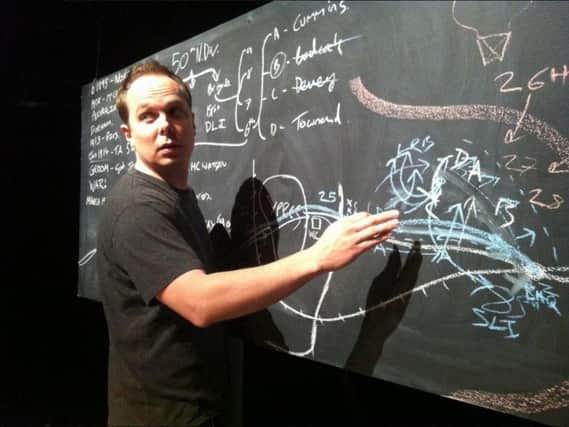World War One commemoration at Petworth Festival


The piece is written around the life of World War One veteran Edgar Huggins. His stories of the battles at Ypres and the Somme are not extraordinary or spectacular; they are honest, shocking and direct – unlike so many of his generation who, in the interest of national security and sparing loved ones at home, held their tongues.
The play focuses on the difficulties of being a survivor and on our need to create heroes, explains director Daniel Llewelyn-Williams.
Advertisement
Hide AdAdvertisement
Hide AdEdgar, the last surviving Durham Light Infantryman, speaks to his great nephew William from beyond the grave in a recorded interview in the one-man show presented by William.
As Daniel says: “It all started when William unearthed some recordings of his great uncle who had done an extended nine-hour interview with the Imperial War Museum. Will, his great nephew, got hold of the interview in early 2000 and thought it would make an interesting piece. He and a friend Jamie Parker, who is currently playing Harry Potter on Broadway, did a two-man show loosely based around the interview, and it had a short run in London about 15 years ago. Later Will revised it and he turned it into this one-man show that I am directing. The show has been completely revisualised and reimagined. Every aspect is different. We have taken excerpts from Edgar and he has created it between Edgar and his great nephew as though they are talking to each other through space and time. The piece is really about Will investigating the policy of silence that soldiers maintained through social pressures and military practice, both after and during the war.
“It stemmed from the desire to keep military secrets secret, but there was also the British social policy about not speaking about your problems. There were certain social pressures that you were not being strong if you spoke about them. It was just not done, and also there was a very different view of mental health then. Now the feeling is that a lot of mental-health issues are solved often by counsel, by talking about them, but contrary to the modern social norms that wasn’t the case back then. But also the play really highlights the dichotomy that because of the silence you lose the ability for the next generation to learn from what has happened and so the next generation make the same mistakes as previous generations and are not able to fully understand the emotional side of what it was like to be there. The piece is presented in three versions of facts. Edgar gives an account of his experiences, but what Will found when he looked at the military records was that his account didn’t quite align with the account of his regiment, his division, his platoon. He also cross-referenced the diaries of other soldiers. And then Will used his own character analysis skills as an actor to imagine what he believes the real emotional story was.
“Edgar was not overtly heroic. He was awarded a medal for his efforts. He was sent to Boulogne to recuperate when he cut his finger on a tin of butter, and then he was sent back again and got shot through the stomach. When he recovered from that, he was discharged, not because of the injuries to his stomach, but because he could not cock his trigger finger because of the injuries to his finger. It saved his life.”
Advertisement
Hide AdAdvertisement
Hide Ad